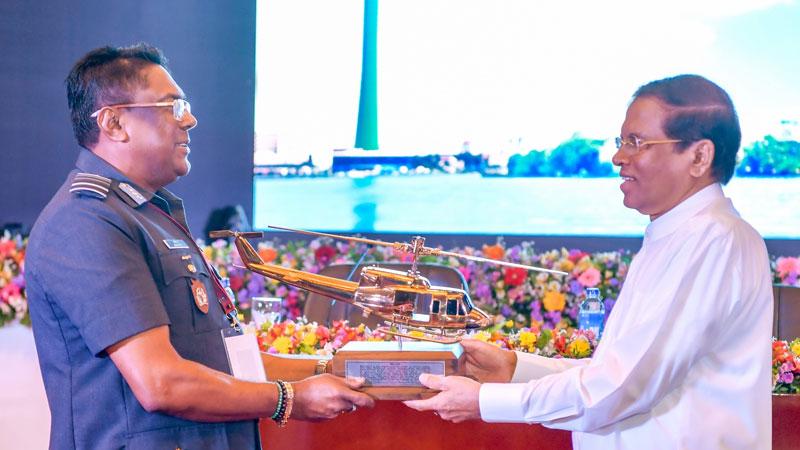
Abiding by Sri Lanka’s foreign policy “friendship with all enmity with none, “ the diplomatic skills, the economic and military hard power of Sri Lanka should be combined to enhance the smart power capability of the nation in collaboration with regional and extra-regional actors to share technologies and knowledge to build up the regional security of the Indian Ocean and Sri Lanka at the core of the region. This will enhance the potential capability by establishing a ‘Combined Air Task Force Hub’ to secure the Indian Ocean Region, Air Vice Marshal S.K Pathirana said last week at the Colombo Air Symposium 2018.
 The Colombo Air Symposium which commenced on Thursday (18) was organised for the fourth consecutive time by the Sri Lanka Air Force.
The Colombo Air Symposium which commenced on Thursday (18) was organised for the fourth consecutive time by the Sri Lanka Air Force.
President Maithiripala Sirisena graced the occasion while State Defence Minister Ruwan Wijayawardene, Sustainable Development, Wildlife, and Regional Development Minister Field Marshal Sarath Fonseka, Defence Ministry Secretary Kapila Waidyaratne were among the guests.
Addressing the Symposium Air Vice Marshal Pathirana said the Indian Ocean facilitates the international community as a major trade route and also plays a major role in the distribution of Gulf oil to Asia which is the lifeline for the majority of Arab Gulf countries.
 Speaking on the economic importance of the Indian Ocean he said, “A yearly trade that passes through the new Silk Route, from the Strait of Hormuz to the Strait of Malacca, has been estimated at US$18 trillion, roughly 17 million barrels, and thus, one-fifth of the world’s oil supplies pass through the Strait of Hormuz. Five of the largest world oil producers including the United Arab Emirates use the narrow passage for most of their energy exports as well as moving of other goods constituting its re-export industry.
Speaking on the economic importance of the Indian Ocean he said, “A yearly trade that passes through the new Silk Route, from the Strait of Hormuz to the Strait of Malacca, has been estimated at US$18 trillion, roughly 17 million barrels, and thus, one-fifth of the world’s oil supplies pass through the Strait of Hormuz. Five of the largest world oil producers including the United Arab Emirates use the narrow passage for most of their energy exports as well as moving of other goods constituting its re-export industry.
At the same time, the Gulf Cooperation Council as a whole is the number one trading partner of India and China, with a two-way trade estimated at over $150 billion per annum”. He pointed out that due to its substantial amount of energy and goods transfer the Indian Ocean has shifted many stakeholders from state to non-state actors. This, in turn, has attracted some non traditional security threats to the region to destabilise the global economic balance. Thus, many global actors have focused their attention on individually securing their economic interest in the region.
“Sri Lanka possesses an Exclusive Economic Zone which is seven times larger than the country, furthermore, the island is to claim the continental shelf that extends up to 350 nautical miles from the baseline in the year 2025. This, in turn, will increase the sea area and make it 23 times larger than the island. Apart from ships, there are approximately 45000 international aircraft movements overflying the region annually. As a contracting state to the International Civil Aviation Organization, Sri Lanka has the responsibility of deploying rescue aircraft in case of aircraft ditching or crashing in the search and rescue region. Therefore, protecting the ocean seas is a daunting task for the island nation with the limited technological capability and is too much on our plates to handle” Mr.Pathirana explained.
Air Vice Marshal Pathirana noted the Government’s vision of a 2025 blue economy deeply entrusts the nation on maritime for energy and resources. Therefore, it is important to monitor, secure and to accommodate free passage in the Indian Ocean Region. Hence , it is foreseeable that with Sri Lanka’s strategic location and nonaligned posture, it should be able to achieve peacekeeping, peacemaking and economic development that will bring multiple benefits to the region and the world.
Pix: Courtesy Presidential Media Divison
